“Is it possible to tell a good human interest story without descending to mawkishness?” asks the Guardian‘s Xan Brooks. “That’s the dilemma faced by the journalist hero of Stephen Frears‘s new film and it is also, by implication, the problem confronting the drama itself as it embarks on its task of spinning glucose into gold. Thankfully, not every human interest story is trashy by nature. Not every happy ending is therefore also a lie. Philomena, which bowed to rapturous applause at the Venice film festival, is an ongoing, confounding delight of a film.”
Andrew Pulver, another Guardian writer, sketches the background: “The film is the story of an Irish working-class woman called Philomena Lee as she searches for the son who was forcibly removed from her by the nuns running the convent where she had been placed after becoming pregnant. Lee worked in an abbey laundry in Roscrea, County Tipperary, in a not dissimilar situation to the girls in Peter Mullan’s film The Magdalene Sisters. Lee’s quest, crucially, was taken up by former BBC correspondent and former Downing Street spin doctor Martin Sixsmith, on whose book the film is based. Steve Coogan, whose company Baby Cow produced Philomena, stars as Sixsmith, while Judi Dench plays the title role.”
“It’s an undeniable whopper of a yarn,” writes Variety‘s Justin Chang, “and, coming after a string of middling efforts from Frears, easily the director’s most compulsively watchable picture since The Queen. It hardly gives away the story’s outcome (by now of course a matter of public knowledge) to note that Martin and Philomena’s journey winds up leading them, after a fashion, back to the Church’s doorstep, setting the stage for an emotionally satisfying confrontation with the institutional forces of judgment, repression and hysteria responsible for exploiting countless mothers and their long-lost children.”
“Conflicted sexual identities, enduring institutional corruption and raw, never-to-be-resolved grief are all teased out of this one mild-mannered woman’s sentimental journey—with a hearty side order of Catholic guilt, of course.” Guy Lodge at In Contention: “Timing its unexpected reveals with Swiss-watch precision for maximum pathos, and patronizing its salt-of-the-earth title character by playing her cultural and intellectual limitations for sympathetic laughs, Philomena is human interest filmmaking of a classy and highly effective order, but its repeated sneers at the adjusted-reality fixation of modern middlebrow culture are more than a little disingenuous.”
“This is Frears’s strongest film in quite some time (yes, even better than Lay the Favorite), the simplicity of the material giving rise to a series of ever-more-complex and subtly articulated spiritual quandaries,” writes David Jenkins at Little White Lies. And “even though the film appears to initially pitch itself as a mis-matched, inter-generational buddy comedy road movie which pokes fun at the obvious class and cultural chasms that exist between the two protagonists, it eventually evolves into something far more sophisticated. Frears never allows the relationship between Sixsmith and Philomena to properly settle, and duly steers clear of icky sentimentalism and Oscar clip euphoria at moments where it could’ve been very easy to veer down that darkened alley.”
“It’s powerful and very moving stuff, but Frears is careful to treat it with a light touch, and to leaven the more serious moments with a joke without lessening the drama,” writes Oliver Lyttelton at the Playlist. “Coogan and [co-writer Jeff] Pope’s script deserves particular credit for this. As much as the film has that predestined Academy comedy-drama sheen to it, the screenplay is spikier and angrier than it has any right to be.”
“It’s a terrifically moving film,” agrees Time Out‘s Dave Calhoun, with “a well-earned ring of complicated truth to it.” Screen‘s Mark Adams calls it “a real delight.” The Hollywood Reporter‘s Deborah Young predicts that the “inspired pairing of Dame Judi Dench and actor-writer-producer Steve Coogan, who is currently riding the wave of the British hit Alan Partridge: Alpha Papa, will clinch the deal for most viewers.”
Writing at Thompson on Hollywood, Matt Mueller notes that Coogan’s “antipathy towards the media is well known—he and Hugh Grant were the two highest-profile campaigners in favor of new restrictions on press intrusion—so it’s amusing watching him play someone trying to air dirty laundry for the middle-market tabloid he despises the most (the Daily Mail, although it’s not mentioned).”
Domenico La Porta talks Frears for Cineuropa, where, in his accompanying review, he calls Philomena “a nearly faultless work.”
Philomena‘s competing in Venice, will be a Special Presentation in Toronto, and, as the BFI’s announced, will be a gala presentation at the London Film Festival.
Updates, 9/1: “Coogan, the comic who has played the shallow chat-host Alan Partridge on TV for nearly 20 years, brings an agreeable, sometimes awkward gravity to Martin,” writes Mary Corliss for Time. “Sophie Kennedy Clark rings all notes of helplessness and holy fury as the young Philomena. But this is Dench’s triumph. At 78, she has a golden career behind her, often as queens (Mrs. Brown, Shakespeare in Love) and other frosty matriarchs (James Bond’s M). So the warmth under pressure she radiates here is nearly a surprise.”
“The brilliance of Dench’s performance lies in the sure-footed way she combines comedy and extreme pathos without ever lapsing into caricature,” adds Geoffrey Macnab in the Independent. “Coogan underplays beautifully, hiding his own emotions behind ironic one-liners.”
Update, 9/3: “Dench and Coogan sell it well, occasionally cutting through the high-minded sentiment to dig up some real emotion,” writes Jon Frosch for the Atlantic. “But coming from the director who gave us films like the nimble, imaginative The Queen and the delicious noir The Grifters, this is far from Frears at his best.”
Update, 9/5: Geoffrey Macnab talks with Frears for the Independent.
Update, 9/8: Anthony Lane for the New Yorker on seeing Philomena in Venice: “Elsewhere, perhaps, its steadiness might be construed as staidness, and the confidence of its moral pursuit as a trifle smug; yet, surrounded as it was by many films that veered towards self-importance, or whose visual allure was badly scarred by poor writing, Frears’s work felt all the more welcome in its restraint. We prepared ourselves for an emotional explosion—not for physical violence, but for that of a bursting heart—and yet, when the time came, that is not what happened. Frears put the pin back in the grenade, as it were; when was the last time you experienced that in a cinema?”
Updates, 11/1: “Stephen Frears’s direction is ‘look, no hands’ masterly,” writes Nigel Andrews in the Financial Times. “He doesn’t editorialize. Sometimes he barely inflects. He allows a full transparency for nuance and paradox, for surprise grace-notes and deftly limned ambiguities. This is a doleful, radiant, understated comedy of hope and faith. That’s almost a definition of good British cinema.”
Frears is “an abidingly honest director whose integrity is matched every step of the way by his sweetly wigged and accented leading lady,” writes Matt Wolf at the Arts Desk. “In lesser hands, this could have been merely the tale of a cute old Irish dear (Philomena more or less announces herself as that at the start) and the pent-up Oxbridge type who starts to soften under her tutelage. But just when the divisions between the two look set to go the standard-issue route, the film commendably widens its focus, stirring Reagan-era politics, the oppressiveness of the Catholic church, and the perennial appeal of the romance novel into an ever-thickening moral brew.”
“Could it be that Coogan, the great accuser and challenger of the press, is conducting a creative thought-experiment?” wonders the Guardian‘s Peter Bradshaw. “Turning the journalists into the good guys? At any rate, the result is a moving and exhilarating film, and the strange chemistry between Dench and Coogan ferments into a 120-degree proof emotional drama.”
Update, 11/16: “For writers Steve Coogan and Jeff Pope,” writes Jesse Cataldo at Slant, “adapting Martin Sixsmith’s The Lost Child of Philomena Lee seems like an occasion to tweak familiar formulas, as they exhibit a compulsive need to distance themselves from the story’s intrinsic sentimentality. For director Stephen Frears, it’s a chance to play up that same sentimentality, underscoring emotional moments with excessive bathetic flourishes. Working at cross purposes, these two sides make for a fractious movie whose internal conflicts mirror those experienced by its odd-couple leads.”
Updates, 11/20: “Intelligence ebbs and flows in Dench’s eyes, depending on how clever Philomena chooses to be in a given situation,” notes Inkoo Kang in the Voice. “Needless to say, the grande dame’s performance, alternately goofy and grave, is an absolute tour de force.”
“Even in sympathetic roles,” writes Mary Corliss in Time, “Dench has been a figure of efficiency and common sense. Warmth has seemed out of her range. Yet warmth under pressure is Dench’s gift to her character in Stephen Frears’ funny, angry Philomena.”
Throw in Coogan, and you’ve got “a tonic to all the Oscar-season showboating,” writes Joshua Rothkopf in Time Out New York. “Call it Best Duo.”
Coogan and Philomena Lee herself are guests on the Leonard Lopate Show.
Updates, 11/22: “Perhaps unavoidably, the film takes a turn for the serious and angry,” writes the Dissolve‘s Keith Phipps. “A few contrived scenes toward the end feel like betrayals of the easy rhythms the film has established. It never isn’t a happy story, but what makes it effective isn’t the facts of the case, so much as the way Philomena lets viewers spend time with its characters and get to know exactly who’s getting hurt. It arrives at an inevitable destination, but the journey is what makes it moving.”
At RogerEbert.com, Susan Wloszczyna notes that Martin and Philomena’s “contrasting reactions to what they uncover allow Frears to condemn the Catholic Church for sanctioning such a cruel racket while upholding the importance of such core religious values as forgiveness and understanding.”
Update, 12/15: Matthew Garrahan lunches with Coogan for the Financial Times.
2013 Indexes: Venice and Toronto. For news and tips throughout the day every day, follow @KeyframeDaily on Twitter and/or the RSS feed. Get Keyframe Daily in your inbox by signing in at fandor.com/daily.





